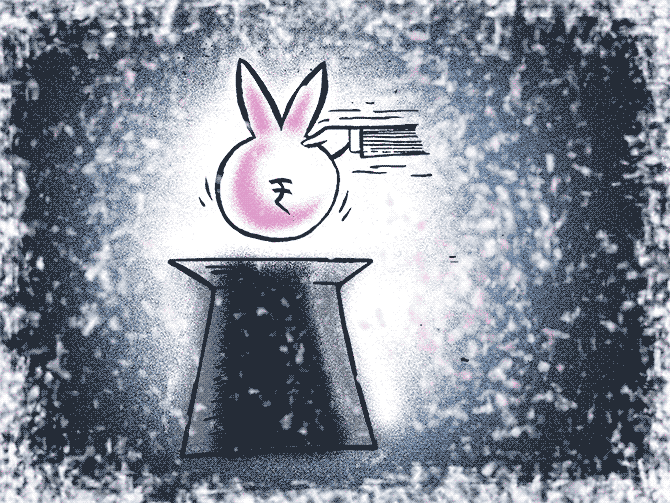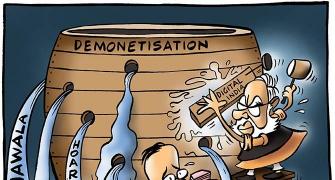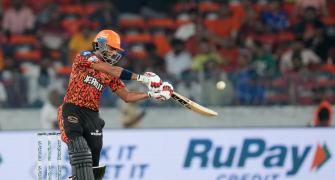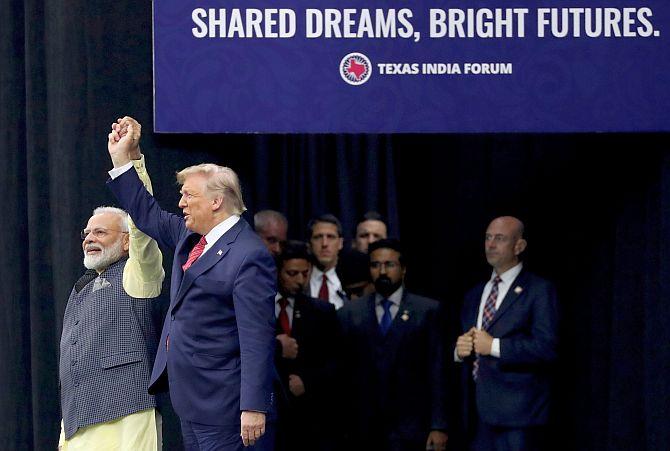The current mela comes at a time when the red lights are flashing in RBI’s Financial Stability Reports.
There is also chatter that retail, agriculture, and micro, small, and medium enterprises will see stress going ahead.
Illustration: Dominic Xavier/Rediff.com

The festive season is truly upon us.
Banks have pitched their tents to offer credit to retail customers and small businesses from Thursday.
The mela is the most ambitious one till date - the outreach camps will pan across 400 districts.
The idea behind the mela is that it will revive demand in a sluggish economy, and is inspired by “supply creates its own demand”.
It may, however, not go according to the script imagined.
The plot seems to have been lifted from Congressman Janardhan Poojary’s stint as the minister of state for finance during the prime ministerships of Indira Gandhi and Rajiv Gandhi (till 1987).
It is not clear how much was doled out during the jamborees of the 1980s - there is little by official records on it, and the central bank’s reports on trend and progress of those periods are not available on the internet.
But the damage caused by these jamborees was summed up by M Narasimham, the former governor of the Reserve Bank of India (RBI), in his first committee report on financial sector reforms in 1991.
“Loan waivers can be regarded as the prodigy of those melas,” observed the committee.
“In the name of the poorer sections of society, just about anything can be twisted,” the committee noted.
And “the means became the ends in lending”.
This was clearly evident in the priority sector loans where bank managers were more interested in ensuring they lent more to these sectors.
The emphasis was on providing credit and there was no equal emphasis on recovery of credit.
Loan melas showed an official blessing for the abandonment of the principle of credit appraisal. Credit appraisal took a backseat.
The RBI’s history (Volume IV: 1981-1997) says that while loan melas pushed by Poojary invited sharp criticism from many, including bank staff, on the grounds of heavy leakage, corruption, and partisanship, political leaders tended to adopt a public posture, which generated a feeling among borrowers that they did not need to worry about discharging their debt.
Promises of loan write-offs were offered generously, especially on the eve of elections.
The ministers in the government did not hesitate to instruct bank officials to oblige certain favoured loan applicants, who had strong political backing.
Cut to the present. The current mela comes at a time when the red lights are flashing in RBI’s Financial Stability Reports (FSR).
The FSR of June 2019 (the latest), says asset quality across broad sectors improved in FY19 against September 2018, except in agriculture, which showed a marginal increase in the gross non-performing asset ratio (GNPA) at 8.5 per cent, up from 6.3 per cent in FY18.
The FSR of December 2018 made mention of retail GNPAs as a sector too - it stood at 2.3 per cent in September 2018 over the 2.2 per cent at close of FY18.
There is chatter that retail, agriculture, and micro, small, and medium enterprises will see stress going ahead.
The shift to external benchmark-based lending on incremental loans is a variable, which has the potential to add to bad loans in a rising interest rate scenario.
Or look at the great farm loan waiver scheme of 2008.
The central bank in its report on trend and progress of banking for (2010-11) said that agricultural NPAs to agricultural advances of banks, which declined in FY09 due to the implementation of the agriculture debt waiver and relief scheme witnessed an increasing trend thereafter.
In FY11, state-run banks saw an increase in the agricultural NPAs ratio as compared with private sector banks.










